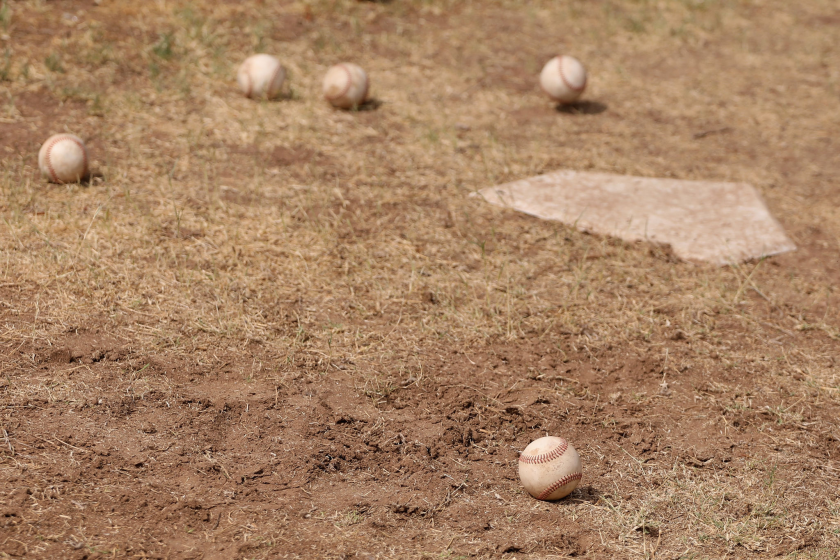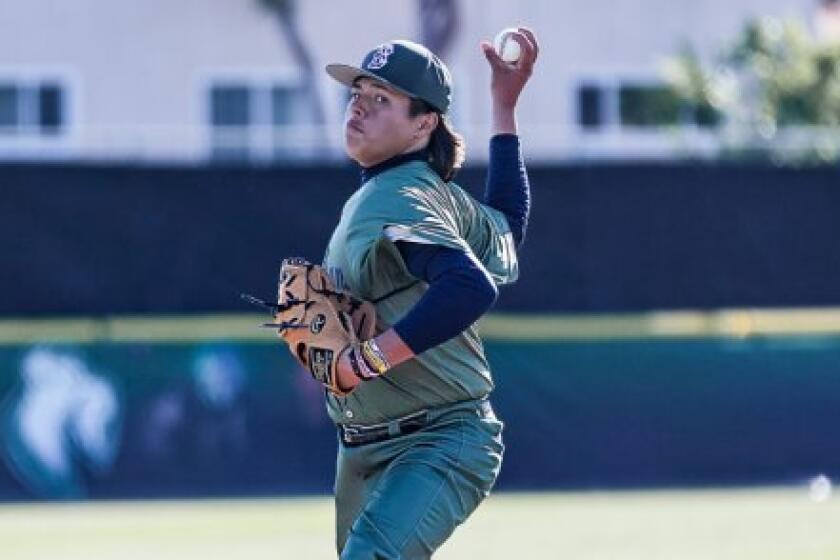Las Vegas Can’t Get the Point : Seeing Is Not Believing: Rebels Upset, 89-88
- Share via
In one of the most bizarre occurrences ever seen on sports television, a college basketball official put on a CBS headset and watched a replay in order to make a ruling Saturday.
As it turned out, the official made the incorrect ruling, and it cost No. 1-ranked Nevada Las Vegas a point just before halftime in a game against Oklahoma at Norman, Okla.
Las Vegas ended up losing, 89-88.
The unusual sequence of events took place at the end of the first half, when an Oklahoma fan in the crowd twice blew an air horn.
The first time, play was stopped and Las Vegas retained possession with five seconds left. The Rebels took the ball out and worked it to Gary Graham on the right side.
Just before Graham put up a shot, the fan’s air horn sounded again. An official, again fooled by the bogus air horn, thought it was the official signal for the end of the first half and threw his hands into the air to signal that play was over. As he did so, he took his eyes off Graham. The Rebel player, who had started his shooting motion, continued with the shot, and it went through the hoop.
Another official ruled the basket was good because official time had not run out.
Oklahoma Coach Billy Tubbs, naturally, argued that the basket should not have counted. Nevada Las Vegas Coach Jerry Tarkanian argued not only that the basket should count but also that it was a three-pointer because Graham shot from behind the three-point line.
Tarkanian suggested checking the television replay.
Eventually, that’s what an official did. Commentator Billy Packer loaned the official his headset so he could hear the CBS director, John McDonough, in the production truck.
Play-by-play announcer Brent Musburger, probably as startled as anyone by what was taking place, at first asked the official his name.
Musburger, rather than stepping back, continued questioning him.
“What are you looking for?” Musburger asked.
“We’re trying to determine if time was out when he shot,” the official told Musburger, loud enough for the viewing audience to hear.
The replay clearly showed there was one second left when Graham made his shot, and he was credited with two points.
Asking for the replay again, the official said: “We’re also trying to determine if the player shot from behind the three-point line.”
Then came a comment by Musburger that may have cost Las Vegas the game and its No. 1 ranking.
“Our replay is inconclusive,” Musburger said.
“If you say it’s inconclusive, then the basket remains a two-pointer,” the official said, and he walked off.
But CBS then showed another replay to its viewers, from a different angle. It clearly showed that the basket was a three-pointer, which Packer had claimed all along.
“What do we do now--get the officials out of the locker room and show them this replay?” Musburger said.
It was too late.
Meanwhile, Ted Shaker, the executive producer of CBS Sports, in Los Angeles for next Sunday’s Super Bowl game, was watching the game at the CBS studios in TV City on Fairfax Avenue.
“Absolutely remarkable,” Shaker said. “I’ve never seen anything like it.”
Shaker called the production truck in Norman and said to forget about the planned halftime features and concentrate on that last shot. He suggested checking the rule book and also inviting the officials out to be interviewed.
“The officials declined to come back out,” Shaker said.
Packer, after a commercial break, brought out an NCAA rule book and explained that the TV replay could be used to correct an error involving the game clock but not an error in judgment.
Thus, checking the replay to see if time had run out when Graham shot was proper. But checking it to see if the basket was a two-pointer or a three-pointer was not.
However, the fact remains that the official did indeed check the replay for that purpose and might eventually have ruled in Las Vegas’ favor had Musburger not become involved.
“I don’t see how in any way we affected the outcome of that game,” Shaker said. “I thought we did a pretty good job of covering the story.
“But I will say that this is a good example of how awkward it can be when television gets involved with officiating. I’m sure we haven’t heard the last of it.”
According to wire service reports, the officials working the game were Rick Wulkow and Mike Tanco of the Big Eight and Norm Borucki of the Pacific Coast Athletic Assn.
After the game, Wulkow, according to Associated Press, said: “We looked at the replay to determine whether any time was left in the half. We can only use the instant replay for time. We made the decision of two points out on the court. I and the other official (Tanco) came together and made that decision.”
But a national television audience had heard the request for a replay to determine whether the shot was a two-pointer or a three-pointer.
Also, as Packer pointed out, another replay showed an official signaling three-pointer.
Immediately after the game, Tarkanian downplayed the mistake. “That had nothing to do with the outcome,” he said. “I told them (the officials) to check the replay. It’s clear that it was a three-point play, but there’s nothing I can do about it.”
Tubbs, whose team, ranked 16th going into the game and improved to 12-3, had little to say about the incident. “I forgive them (the officials) for that now,” he said. “They used a new-fangled rule. They went and checked the television monitor.”
The controversy overshadowed what turned out to be an exciting game.
Oklahoma’s Darryl Kennedy made a short fadeaway shot with 12 seconds left, and that proved to be the winning shot.
A last-gasp jump shot from the foul line by Las Vegas’ Armon Gilliam bounced off the rim, and a tip-in try by Jarvis Basnight didn’t fall as the Rebels lost for the first time in 16 games. Las Vegas plays at Cal State Fullerton in a Pacific Athletic Assn. game Monday night. Gilliam, who finished with a team-high 23 points, had given the Rebels the lead by a point with a shot down low with 43 seconds to play.
Oklahoma opted to go without a timeout, and it worked.
About his game-winning shot, Kennedy, who finished with 16 points, said: “I had made up my mind I was going to make it. I had missed my last couple of shots, but I made up my mind that time it was going in.”
Las Vegas used a pair of three-point shots by Freddie Banks to take a 58-52 lead three minutes into the second half.
But Oklahoma came back behind Kennedy and David Johnson, who had 22 points, to take a 69-65 lead with 11:47 to play.
The Rebels came back again, however, and twice had a four-point lead, the final time 85-81 with 3:40 to play after Gilliam hit a turnaround jumper.
Grace and Johnson scored consecutive baskets to tie the score before Gilliam made it 88-87 with a foul shot at the 2:11 mark.
With 1:18 to play, Oklahoma’s Harvey Grant, who finished with 23 points and 16 rebounds, made both ends of a one-and-one to give the Sooners the lead again. That set up Gilliam’s go-ahead shot with 43 seconds to play, and Kennedy’s game-winner.
After the game, Tubbs told reporters: “It’s up to you guys and the polls. I think we should be No. 1, or leave Vegas there.”
More to Read
Go beyond the scoreboard
Get the latest on L.A.'s teams in the daily Sports Report newsletter.
You may occasionally receive promotional content from the Los Angeles Times.










